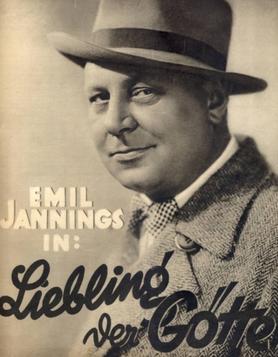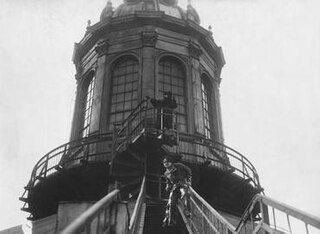Related Research Articles

S.A.-Mann Brand is a German film made around the time that Adolf Hitler became Chancellor of Germany. It was released in mid-June 1933.

Darling of the Gods is a 1930 German musical drama film directed by Hanns Schwarz and starring Emil Jannings, Renate Müller and Olga Chekhova. Jannings had recently returned from Hollywood where the arrival of sound films had harmed his career. The film was made at the Babelsburg studios, and based on the play Die Tokaier by Hans Müller. It was made by Erich Pommer's production unit, part of the German Major film studio UFA. It premiered at the Gloria-Palast in Berlin on 13 October 1930.

Hedda Vernon was a German actress, screenwriter, and film producer. She was a prominent star of the early Weimar Republic, and had her own film production company.

Road to Rio is a 1931 German crime film directed by Manfred Noa and starring Maria Matray, Oskar Homolka and Oskar Marion. It premiered on 15 January 1931. It was shot at the Babelsberg Studios in Potsdam. The film's sets were designed by the art directors Hans Sohnle and Otto Erdmann.

The Women House of Brescia is a 1920 German-language silent film directed by Hubert Moest. The film's alternative name was The House of Pillory. The film was considered highly controversial for the depiction of prostitution. The film's story was set in medieval Europe during the fourteenth century. The film was based on Karl Hans Strobl's novel Das Frauenhaus von Brescia. The Pillory houses were the places where enemy women captured during wartime were imprisoned so that the people could exploit them as they wished. The depiction of prostitution was the basis for the picture's rejection by the British Board of Film Classification in 1921 and its being banned in Germany.
The Sun of St. Moritz is a 1923 German silent drama film directed by Hubert Moest and Friedrich Weissenberg and starring Hedda Vernon and Grete Diercks. The film is based on a novel by Paul Oskar Höcker, and was remade in 1954 as The Sun of St. Moritz.

Circus Beely or What's Going On at the Beely Circus? is a 1927 German silent thriller film directed by and starring Harry Piel.

The Immortal Vagabond is a 1930 German musical film directed by Gustav Ucicky and Joe May and starring Liane Haid, Gustav Fröhlich and Hans Adalbert Schlettow. It is an operetta film, made by German's largest film company UFA. Interiors were shot at the Babelsberg Studios in Berlin. The film's sets were designed by Robert Herlth and Walter Röhrig. The film was remade in 1953.
When the Mother and the Daughter is a 1928 German silent film directed by Carl Boese and starring Fritz Spira, Trude Hesterberg, and Vera Schmiterlöw.
The Sea Cadet is a 1926 German silent drama film directed by Carl Boese and starring Walter Slezak, Gerd Briese and Fritz Alberti. It was shot at the Terra Studios in Berlin. The film's sets were designed by the art director Karl Görge.
The Woman in Gold is a 1926 German-French silent film directed by Pierre Marodon and starring Lotte Neumann, Ernö Verebes and Suzanne Pierson.

Spell of the Looking Glass is a 1932 German comedy drama film directed by Frank Wisbar and starring Franz Weber, Ursula Grabley, and Oskar Karlweis. It was shot at the Johannisthal Studios in Berlin. The film's sets were designed by the art directors Karl Machus and Fritz Maurischat.
The Voice of the Heart is a 1924 German silent drama film directed by Hanns Schwarz and starring Mary Johnson, Fritz Kampers, and Ágnes Esterházy.

Three Nights is a 1920 German silent film directed by Carl Boese and starring Otto Gebühr, Grete Hollmann, and Sybill Morel.

The Call of Destiny is a 1922 German silent film directed by Johannes Guter and starring Xenia Desni, Fritz Kortner, and Ernst Hofmann.
During My Apprenticeship is a 1919 German silent drama film directed by Hubert Moest and starring Hedda Vernon, Reinhold Schünzel, and Wilhelm Diegelmann. It is based on the nineteenth century novel From My Farming Days by Fritz Reuter.

Trix, the Romance of a Millionairess is a 1921 German silent romance film directed by Frederic Zelnik and starring Lya Mara, Ernst Hofmann, and Ilka Grüning. It premiered at the Marmorhaus in Berlin.
The Emperor's Old Clothes is a 1923 German silent film directed by Franz Seitz and starring Dary Holm, Ernst Rückert and Fritz Greiner.
To a Woman of Honour is a 1924 German silent film directed by Rudolf Biebrach and starring Lucy Doraine, Georg H. Schnell and Fritz Greiner.
The Heart of Lilian Thorland is a 1924 German silent film directed by Wolfgang Neff and starring Esther Carena, Evi Eva and Hermann Picha.
References
- ↑ Krautz p. 112